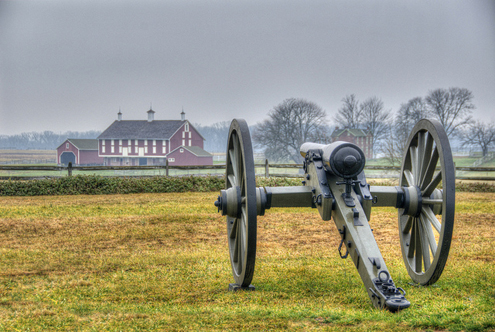InAsia
Insights and Analysis
George Dupont, the Only Thai in the U.S. Civil War
April 8, 2015
Editor’s note: The 182-year history of U.S.-Thai diplomacy is the oldest uninterrupted bilateral relationship between the U.S. and Asia. It’s a history with many colorful chapters. In 1861, Rama IV, known in English as King Mongkut of Siam, offered to send elephants to U.S. President James Buchannan as transportation and beasts of burden. By the time the letter arrived, Abraham Lincoln was president. He replied graciously that the elephants were unlikely to survive in the new climate, and that America now had steam engines. Then there is the singular tale of George Dupont, the only Thai to serve in the American Civil War.

A Civil War cannon overlooking Gettysburg Military Park. Photo/Flickr user Andrew Aliferis http://bit.ly/1N9Y57d
April 9 marks the 150th anniversary of General Lee’s surrender at Appomattox Courthouse, and the end of the U.S. Civil War. It was the bloodiest conflict in U.S. history, killing more people than all of America’s foreign wars combined. More than 3.1 million soldiers took up arms for the Union and the Confederacy, and one of them, a private in the Union army, was a citizen of a nation on the other side of the world, then known as Siam.
His name was Yod. How he came to the U.S. is unclear, but he had been living in Jersey City since 1859. On August 12, 1862, he joined Company B of the New Jersey Volunteers, listing his age as 18. He must have looked much younger, because someone named William Hagen signed a consent form for minors.
Like Yod, most of the New Jersey Volunteers were immigrants – men from Ireland, Germany, and elsewhere in Europe – but Yod was the only Asian. Eventually, he took the name George Dupont. In his book Elephants for Mr. Lincoln: American Civil War Diplomacy in Southeast Asia, military historian William Strobridge wrote, “Born too late to experience the jungle marches and elephant charges of Siam’s wars with Burma, Private Dupont soon witnessed the campaigns of a civil war twelve thousand miles from his home.”
In less than a year, Dupont fought in three of the Civil War’s deadliest battles – Antietam, Chancellorsville, and Gettysburg. He emerged unscathed, but fell sick after Gettysburg and spent time in a military hospital in Alexandria, Virginia. After recovering, Dupont participated in General Sherman’s epic and infamous march through Georgia, where he suffered a wound at the Battle of Kolb’s Farm in June 1864 that hospitalized him for a year in Jefferson, Indiana.
At war’s end, Private Dupont was honorably discharged from the Union Army in Lexington, Kentucky, and awarded $64.30 in back pay and a $75.00 government bounty, including travel expenses back to Jersey City, for completing his service.
Dupont did not stay in Jersey City for long. He moved to Philadelphia, where he found work as a clerk in a type foundry about a block from Independence Hall.
In August 1869, George Dupont became a naturalized U.S. citizen and was issued a passport. Soon thereafter, he left the United States, visiting Japan and China, and arriving in Siam sometime in 1870. No one knows why George Dupont returned. Perhaps he was homesick, but nothing is known about his family. One amateur historian has speculated that he was heartened by the reforms of King Chulalongkorn, but these did not take place until the 1880s.
In Siam, Dupont worked for the Siam Weekly Advertiser, an English language newspaper in Bangkok. When officials learned of his military experience in the Civil War, the government hired him as a drillmaster in the Siamese army. He was officially a “foreign instructor” – no doubt because of his American passport – pulling down the princely sum of $50 per month, a fortune in 19th century Siam that no commoner could have commanded.
After his military work, Dupont traveled widely in Siam as a timber dealer. In November 1889, he was attacked by thieves who shot him in both feet. Because of his injuries, Dupont applied for an American pension under the U.S. Pension Act of 1890. An American physician duly verified his injuries, and Dupont was granted a pension of $12 per month.
Dupont married for the first time in early 1900, but the marriage was short-lived: he died of heart disease on July 18, 1900, and today lies buried in Bangkok Protestant Cemetery. More than 150 years ago, Private George Dupont fought on some of history’s bloodiest battlefields, as far from his homeland as he could be, and he is probably the Civil War veteran buried farthest from the fields on which he fought.
John J. Brandon is senior director of Regional Cooperation programs for The Asia Foundation in Washington, D.C. He can be reached at [email protected]. The views and opinions expressed here are those of the author and not those of The Asia Foundation.
About our blog, InAsia
InAsia is posted and distributed every other Wednesday evening, Pacific Time. If you have any questions, please send an email to [email protected].
Contact
For questions about InAsia, or for our cross-post and re-use policy, please send an email to [email protected].The Asia Foundation
465 California St., 9th Floor
San Francisco, CA 94104
The Latest Across Asia
Program Snapshot
April 18, 2024
News
April 17, 2024

2024 Lotus Leadership Awards
Thursday, April 25, 2024, New York City
The Lotus Leadership Awards recognize contributions towards gender equality in Asia and the Pacific







0 Comments